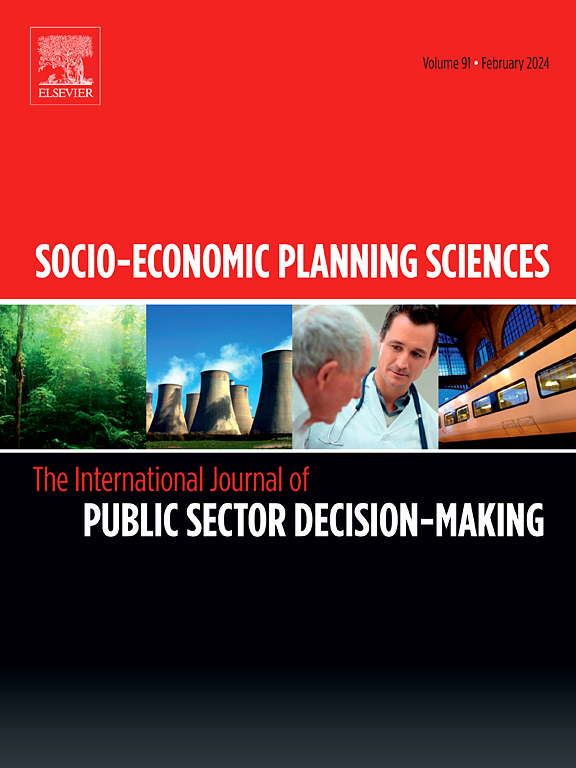Institutional variables and power firms’ productivity: Micro panel estimation with time-invariant variables
IF 5.4
2区 经济学
Q1 ECONOMICS
引用次数: 0
Abstract
Enhancing the productivity of power firms is essential for reducing energy resource consumption while improving sectoral performance. This objective aligns with circular economy (CE) principles, which emphasize not only reducing raw material use and minimizing waste, but also promoting systemic efficiency through infrastructure sharing, resource recovery, and cross-sectoral integration, particularly crucial in network-based sectors like electricity. Nonetheless, the productivity of electricity firms is influenced by multiple factors, some of which fall beyond their direct control. Among these, institutional frameworks play a significant role. Indeed, internal and external institutions define the environment in which companies operate, conditioning firms’ decision-making processes and productivity. This study investigates the role of institutional determinants in driving productivity changes in electricity companies across 15 European countries between 2010 and 2016, with a particular focus on environmental and market regulatory policies. In sectors like electricity, where long asset lifecycles, infrastructure interdependencies, and resource intensity prevail, CE goals cannot be achieved without institutional conditions that enable long-term investment, coordination, and adaptive capacity. Using the firm-level ORBIS dataset, we estimate productivity changes over time using the bootstrap Malmquist index, then a dynamic panel linear model is applied to investigate how internal and external institutional variables affect the dynamics of the Malmquist index. The internal institutional variables are time-invariant; therefore, we employ the procedure proposed by Kripfganz and Schwarz (2019) to consistently identify the effects of time-invariant variables. This novel approach provides valuable robustness to false assumptions about the exogeneity of instruments. Interaction variables capture the interplay between external and internal institutional variables. The results highlight the importance of matching environmental regulations with firm-specific internal characteristics in order to avoid detrimental effects on firm performance in the power generation sector.
制度变量与电力企业生产率:含时不变变量的微观面板估计
提高电力公司的生产力对于减少能源消耗和改善行业表现至关重要。这一目标与循环经济(CE)原则相一致,循环经济原则不仅强调减少原材料使用和最大限度地减少浪费,还强调通过基础设施共享、资源回收和跨部门整合提高系统效率,这在电力等基于网络的行业尤为重要。然而,电力公司的生产率受到多种因素的影响,其中一些因素超出了它们的直接控制范围。其中,制度框架发挥着重要作用。事实上,内部和外部制度决定了公司的运营环境,制约了公司的决策过程和生产力。本研究调查了2010年至2016年期间15个欧洲国家电力公司的制度决定因素在推动生产力变化中的作用,特别关注环境和市场监管政策。在电力等行业,资产生命周期长、基础设施相互依赖、资源强度大,如果没有能够实现长期投资、协调和适应能力的制度条件,就无法实现节能减排目标。本文利用企业层面的ORBIS数据集,利用自提马尔姆奎斯特指数(bootstrap Malmquist index)估计生产率随时间的变化,然后采用动态面板线性模型研究内部和外部制度变量对马尔姆奎斯特指数动态的影响。内部制度变量是时不变的;因此,我们采用Kripfganz和Schwarz(2019)提出的程序来一致地识别时不变变量的影响。这种新颖的方法为关于工具外生性的错误假设提供了有价值的鲁棒性。相互作用变量捕捉外部和内部制度变量之间的相互作用。结果强调了将环境法规与企业特定的内部特征相匹配的重要性,以避免对发电部门的企业绩效产生不利影响。
本文章由计算机程序翻译,如有差异,请以英文原文为准。
求助全文
约1分钟内获得全文
求助全文
来源期刊

Socio-economic Planning Sciences
OPERATIONS RESEARCH & MANAGEMENT SCIENCE-
CiteScore
9.40
自引率
13.10%
发文量
294
审稿时长
58 days
期刊介绍:
Studies directed toward the more effective utilization of existing resources, e.g. mathematical programming models of health care delivery systems with relevance to more effective program design; systems analysis of fire outbreaks and its relevance to the location of fire stations; statistical analysis of the efficiency of a developing country economy or industry.
Studies relating to the interaction of various segments of society and technology, e.g. the effects of government health policies on the utilization and design of hospital facilities; the relationship between housing density and the demands on public transportation or other service facilities: patterns and implications of urban development and air or water pollution.
Studies devoted to the anticipations of and response to future needs for social, health and other human services, e.g. the relationship between industrial growth and the development of educational resources in affected areas; investigation of future demands for material and child health resources in a developing country; design of effective recycling in an urban setting.
 求助内容:
求助内容: 应助结果提醒方式:
应助结果提醒方式:


